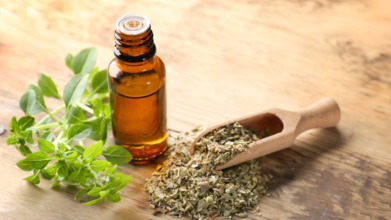- Health Conditions A-Z
- Health & Wellness
- Nutrition
- Fitness
- Health News
- Ayurveda
- Videos
- Medicine A-Z
- Parenting
- Web Stories
GLP1 Medications vs Supplements: What Works Better?

Credits: Canva
Making waves in the news is GLP-1 drugs, especially after Serena Williams, the tennis icon revealed that she used it for her own weight loss journey. This has also become a popular option for many and not just celebrities. However, the cost is high, and not everyone can afford it. Furthermore, cases of side effects have too come up, especially for those who have not followed the prescribed guidelines for its administration and consumption. In such cases, what other options does one have? This is where dietary supplements fit in.
If you have kept up with the Kardashians, you would know that Kourtney Kardashian has launched her own OTC dietary supplements that claims to "naturally boost GLP-1 levels in the body to reduce hunger and support healthy weight management".
In fact, these dietary supplements do not require approval from the Food and Drugs Administration (FDA). These supplements also do not require any data or clinical evidence to support their marketing claims. They are also not regulated or tested like the medication prescribes, which indicates that they could have unknown side effects too.
What Works Better: GLP-1 Medications vs GLP-1 Supplements
Before we get into which one is better, we must understand what are GLP-1 drugs? The Harvard Health Publishing notes that GLP-1 drugs or GLP-1 agonists are shortened names for glucagon-like peptide-1 receptor agonists. They are supposed to mimic GLP-1 hormone that is naturally released in the gastrointestinal tract in response to eating.
What it does is, it triggers the release of insulin from your pancreas, which helps usher glucose or the sugar out of your bloodstream and into your cell. This is where it could be used for nourishment and energy.
The American Journal Of Medicine's 2025 study explains the mechanism of GLP-1 in weight loss. GLP-1 receptor agonists also promote weight loss by suppressing appetite, enhancing satiety and delaying gastric emptying.
What Are GLP-1 Drugs?
Popular drugs like Ozempic and Wgovy, which have semaglutide, which is a GLP-1 receptor agonist, or tirzepatide found in Zepbound and Mounjaro are FDA-approved for type 2 diabetes and weight loss.
These drugs work by binding GLP-1 receptors in the body, which in return increase insulin production in response to food intake and suppress glucagon, a hormones that raises blood sugar.
Also Read: This Naturally Occurring Molecule May Have Ozempic-like Benefits Without The Side Effects
GLP-1 Supplement
Kardashian's Lemme GLP-1 Daily's website notes that it: "promote your body’s GLP-1 production, reduce hunger and cravings, and support fat reduction with three clinically studied ingredients".
However, the website points to studies where the ingredients were investigated separately that too on less than 200 participants. Dr Pamela Tambini, an international medicine physician, based in Florida, as reported by diaTribe says, "The ingredients in these supplements often lack the necessary potency and mechanisms to replicate the effects of prescription GLP-1 medications – without proper testing, their safety and efficacy are highly questionable."
What Are Ingredients In GLP-1 Supplements
Dr Donna Ryan, an obesity medicine specialist at Pennington Biomedical Research Center tells diatribe that there are no GLP-1 in any of the ingredients used in GLP-1 supplements.
Some of the ingredients that supplements note are: Superesa saffron extract, Morosil red orange fruit extract, and Eriomin lemon fruit extract.
Read: Serena Williams Opens Up About Her Weight Loss Journey With GLP-1 Medication
Superesa saffron extract
A study published in Nutrition Research in 2010 noted that this ingredient reduced weight, appetite and snacking frequency. However, experts point out that this study was done 15 years ago, with only 60 participants. However, a recent review published in Frontiers journal in 2024 highlights that it had no significant levels on insulin.
Morosil Red Orange Extract
A clinical trial on “Moro” blood orange extract, published in Nutrients journal in 2022, followed 180 adults with a BMI between 25 and 35. After six months, both those taking the supplement and those on placebo showed notable reductions in BMI, suggesting that the benefits may not be solely due to the extract.
Eriomin Lemon Extract
Preliminary research on Eriomin lemon extract, published in Wiley Open Access Collection in 2019, has shown it may help increase GLP-1 levels in people with prediabetes. However, these studies only tracked participants for 12 weeks, so its long-term impact on weight loss and blood sugar management remains uncertain.
Berberine
Often called “nature’s Ozempic,” berberine is widely used in GLP-1 dietary supplements such as Terra ELMNT’s Berberine + GLP-1 Support and Codeage’s GLP-Advantage+. This plant-derived compound has been used for centuries in traditional medicine to address digestive issues and inflammation. Reviews, publishd in Frontiers journal in 2022, suggest it may help lower fasting blood sugar and A1C levels, though most studies come from China, making its effectiveness across diverse populations less clear.
Chromium
Chromium, found in supplements like Codeage’s GLP-Advantage+ and Joi’s GLP-1 Assist, has limited evidence supporting its role in blood sugar control. While some research, among one is published in 2021 in the Biological Trace Element Research, indicates it may help reduce A1C levels in people with type 2 diabetes, it does not appear to significantly affect fasting blood glucose or cholesterol levels.
Is Oil Of Oregano Really A 'Magic Cure'?

Credits: Canva
Oil of oregano, also known as oregano oil, is a concentrated extract derived from the leaves of the oregano plant. Typically available in liquid drops or capsule form, it has long been promoted for its potential health benefits, particularly during cold and flu season. Some people dilute it in water or juice, while others add it to their supplement routine.
For centuries, oregano oil has been praised in traditional remedies for its antimicrobial and immune-supporting properties. Modern studies suggest that compounds like carvacrol and thymol found in the oil may help fight certain bacteria, fungi and viruses, at least in laboratory and animal studies.
But experts caution against overestimating its power. As USA Today quotes Mascha Davis, MPH, RDN, a registered dietitian and nutritionist, “While oil of oregano can be part of a short-term wellness strategy, it’s not a magic cure-all.” Much of the evidence so far has not been tested in humans, making it difficult to draw strong conclusions about its effectiveness.
Why Was It Believed To Be A 'Magic Cure'?
Oregano has long been associated with Romans and Greeks and is said to trace back as early as 3000 BC, when it was used by Assyrians. It has been used in folk medicine for over many centuries and is extracted from the leaves of oregano. In the Middle Ages, the plant was considered a magic herb that could ward off witches and even the devil himself. This is why the oil extracted from it earned its name as the 'Magic Cure'.
Also Read: ‘Drink Castor Oil To Cleanse Your Colon,’ Says Sadhguru, But Science Isn’t Convinced
What It Can and Can’t Do
Research shows oregano oil does have antimicrobial and antioxidant properties, but clinical trials on humans remain limited. Benefits linked to digestion or immunity have largely been observed outside the human body, in cell or animal studies.
Who Should Avoid It
Despite its popularity, oil of oregano isn’t safe for everyone. Davis also advises that those who are iron deficient, pregnant, breastfeeding, allergic to mint, or taking certain medications, such as blood thinners or drugs for diabetes, should avoid it unless directed otherwise by a healthcare provider.
Even healthy individuals should use it with caution. Because it’s highly concentrated, taking too much or using it without dilution may irritate the gut lining. Experts recommend using it sparingly and only for short durations, such as a few days to a week, while closely following dosage instructions.
Read: The Truth About Cooking Oils: Which One Should You Really Use?
The Bigger Picture
Relying on oregano oil alone for long-term health isn’t sustainable. Experts emphasize that proven habits, like eating a nutrient-dense, plant-based diet, getting quality sleep, managing stress, and incorporating probiotics, are more effective for maintaining immunity and gut health in the long run.
The takeaway? Oil of oregano may have its place as a short-term supplement, but it’s not the all-in-one remedy it’s often marketed to be.
Read More: Common Cooking Oil Ingredient May Cause Your Breast Cancer
Better Diet Could Help Defeat Tuberculosis, Says ICMR Study Backed by WHO

(Credit - Canva)
The dangers of tuberculosis may seem like the thing of the past; however, its effects still remain. The World Health Organization has speculated that TB has returned to being the leading cause of death all around the world after 1.25 million people died of it in 2023. In the same year, an estimated 10.8 million people fell ill with TB with 6 million men, 3.6 women and 1.3 million children. The surprising fact is that the TB present in all these countries, is curable.
There are many factors that affect how well a country tackles TB with. A study funded by the Indian Council of Medical Research (ICMR) has shown that better nutrition can significantly reduce tuberculosis (TB) cases and deaths. The World Health Organization (WHO) has recognized these findings and included them in its updated global guidelines for controlling the disease.
The main goal of the study was to see how giving nutritional support to people living with TB patients would affect whether they got the disease themselves.
What Are Some Factors That Can Help Cure TB?
Researchers worked with 2,800 TB patients and their families in four districts of Jharkhand, India. The study, published in the medical journal The Lancet, noted that in India, TB and poor nutrition are very common at the same time, especially among patients and in the general population.
In the study, all TB patients received food for six months. However, only the families in the "intervention group" received monthly food packages and micronutrients. The researchers followed up with all participants to see how many new TB cases appeared over time.
How Does Nutrition Impact TB?
The study, which ran from 2019 to 2021, found that giving nutritional support to families of TB patients led to a significant drop in new TB cases. This was the first study of its kind to show that nutritional help can substantially reduce the spread of TB within a household.
The study concluded that this approach, which combines medical and social support, could help speed up the fight against TB in communities where both TB and poor nutrition are big problems.

Nutrition and Tuberculosis: Why Does It Impact So Many People?
According to a 2025 study published in the Tropical Medicine and Infectious Disease, looked at how nutrition programs for people with tuberculosis (TB) are working in India. Researchers talked to TB patients, their family members, and healthcare providers in five different states between August 2023 and April 2024. The goal was to understand their experiences and thoughts on getting nutritional help.
Understanding Nutrition
Patients and their families understood that good nutrition is important for treating TB. However, they faced challenges in getting the right foods.
Changes in Diet
While many tried to eat more protein, they often struggled with food insecurity—meaning they didn't have enough food because they were poor.
Issues with Financial Aid
The Direct Benefit Transfer (DBT) program, which gives money directly to people, had problems. Participants felt the money wasn't enough and that there were gaps in how they could access it.
Preferred Delivery Method
People preferred getting food and support directly from TB treatment centers. They were less keen on using other systems or middlemen to get their nutritional help. Based on these findings, the study suggests a few changes to improve the program:
- Provide more protein-rich food and increase the financial support to better meet people's needs.
- Fix the problems with the DBT program to make sure people can easily get the money they are given.
- Consider giving ready-to-eat food directly to patients at TB treatment centers.
Shoppers Beware From The Radioactive Shrimp! Walmart Recalls Popular Frozen Seafood In 13 States

Credits: Canva
Walmart has recalled certain lots of its frozen, raw shrimp sold across 13 states after federal officials detected traces of radioactive contamination. The U.S. Food and Drug Administration (FDA) confirmed that the shrimp may contain Cesium-137, a radioactive isotope, and urged consumers to dispose of the affected products immediately.
What Triggered the Recall
The FDA said it asked Walmart to pull three lots of its Great Value brand frozen shrimp from store shelves after routine inspections revealed contamination. The agency detected Cesium-137 in both shipping containers and in a sample of frozen breaded shrimp imported from Indonesia.
Although the levels found were far below the FDA’s intervention threshold, officials said the recall was issued as a precaution.
The contamination was linked to products processed by P.T. Bahari Makmur Sejati, operating as BMS Foods of Indonesia. U.S. Customs and Border Protection first raised the alarm after detecting Cesium-137 in containers arriving at ports in Los Angeles, Houston, Miami, and Savannah, Georgia.
Potential Health Concerns
Cesium-137 is a byproduct of nuclear activity, including weapons testing, nuclear power plant operations, and accidents. While trace amounts of the isotope are already present in the environment, including soil and food, prolonged exposure can increase the risk of health problems.
ALSO READ: Are Power Plant Emissions Really Not Dangerous, As The EPA Claims?
“The risk from the recalled shrimp is quite low,” said Donald Schaffner, a food safety expert at Rutgers University. Still, FDA officials emphasized that minimizing unnecessary exposure is important. “If you have recently purchased raw frozen shrimp from Walmart that matches this description, throw it away,” the agency said in a statement.
What Consumers Should Look For
The recall applies specifically to Great Value brand frozen raw shrimp with the following lot codes:
- 8005540-1
- 8005538-1
- 8005539-1
All three carry best-by dates of March 15, 2027. The products were distributed in Alabama, Arkansas, Florida, Georgia, Kentucky, Louisiana, Missouri, Mississippi, Ohio, Oklahoma, Pennsylvania, Texas, and West Virginia.
Customers who purchased the shrimp can return them to any Walmart store for a full refund, or simply discard them.
How the Contamination Was Found
FDA investigators collected several samples following the customs alert and discovered one contaminated batch of breaded shrimp. The containers flagged at the ports were denied entry into the U.S. But officials later learned that Walmart had received products from shipments that slipped through without triggering contamination warnings.
As a result, Walmart moved quickly to issue a recall. “As soon as we were made aware of the FDA findings, we took immediate action to remove the affected products from our stores,” a Walmart spokesperson said.
Read more news on food recalls
Why Cesium-137 Raises Red Flags
Cesium-137 has been a global concern since the mid-20th century when nuclear testing and accidents released it into the environment. Unlike naturally occurring elements, Cesium-137 is man-made and has a half-life of about 30 years, meaning it can persist in ecosystems for decades.
Ingesting contaminated food over time, even at low levels, could contribute to radiation exposure. While the FDA stressed that the amounts detected in the shrimp were well below harmful levels, experts say cumulative exposure is worth avoiding.
A Precautionary Step
The FDA said its investigation into BMS Foods of Indonesia is ongoing, with inspectors reviewing shipping and production practices. The agency also assured the public that the contamination detected does not represent a widespread risk to the U.S. food supply.
“Consumers should understand that this is not a major food safety crisis,” Schaffner noted. “It is a targeted recall, and the system worked as it should to identify, contain, and address the issue.”
What Happens Next
For now, the FDA continues to monitor imports from the supplier and will take further steps if necessary. Walmart has pledged full cooperation with regulators and stressed that customer safety is its priority.
While the health risk is considered minimal, officials say the recall underscores the importance of vigilance in food safety systems. By acting quickly, they hope to reassure consumers and prevent long-term exposure to contaminants that could pose problems over time.
© 2024 Bennett, Coleman & Company Limited

